Table of Contents
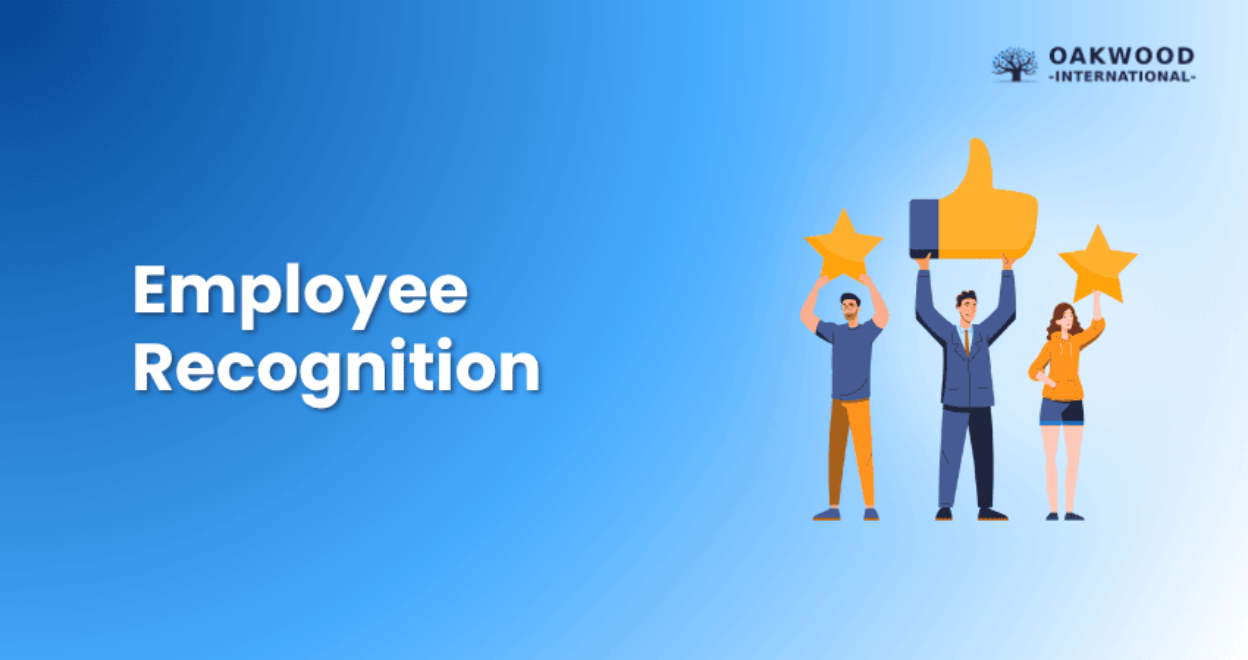

Imagine putting in hours of hard work, meeting deadlines, and going the extra mile; only to feel like no one noticed. Would you stay motivated? Most people wouldn’t. That’s why Employee Recognition matters. It’s not just about saying “thanks”; it’s about showing employees that their contributions are valued, seen, and celebrated.
In this blog, we’ll explore everything you need to know about Employee Recognition, its definition, different types, benefits, and practical ways to make your team feel truly appreciated. So read on and turn appreciation into impact.
What is Employee Recognition?
Employee Recognition refers to the act of appreciating or acknowledging the efforts and contributions of employees. It can take many forms, such as praise, rewards, or even a simple thank-you. The main goal is to make employees feel seen and valued for their hard work within the organisation.
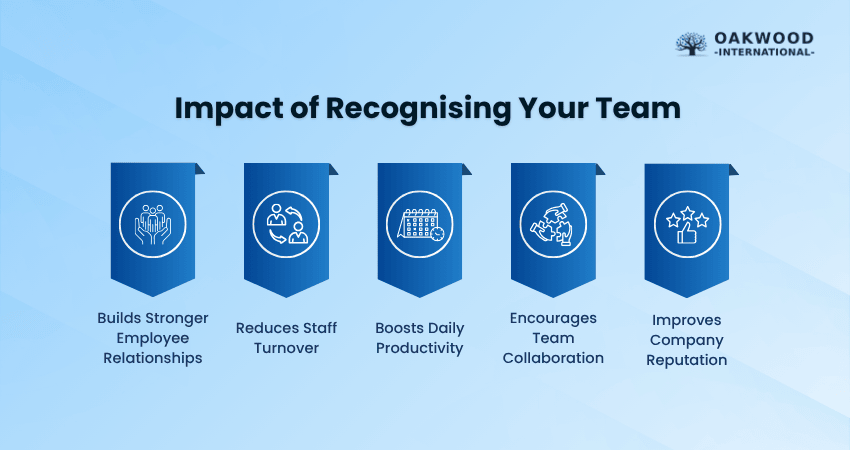
When done right, recognition reinforces positive behaviours and encourages employees to continue delivering high performance. It also helps build a deeper sense of belonging and loyalty by connecting employees to the organisation’s purpose and values, leading to a more engaged and motivated team.
Why Employee Recognition is Important?
Employee Recognition plays a big role in shaping a positive workplace culture and supporting lasting organisational success. When people feel acknowledged for their efforts, they are more likely to take pride in their work, stay committed and consistently deliver high-quality results.
Essentially, recognition helps employees feel respected, which boosts morale. For organisations, this leads to more motivated teams, improved customer experiences, greater innovation and a healthier, more productive working environment overall.
Types of Employee Recognition
Employee Recognition comes in various forms. Here are eight common types of recognition:
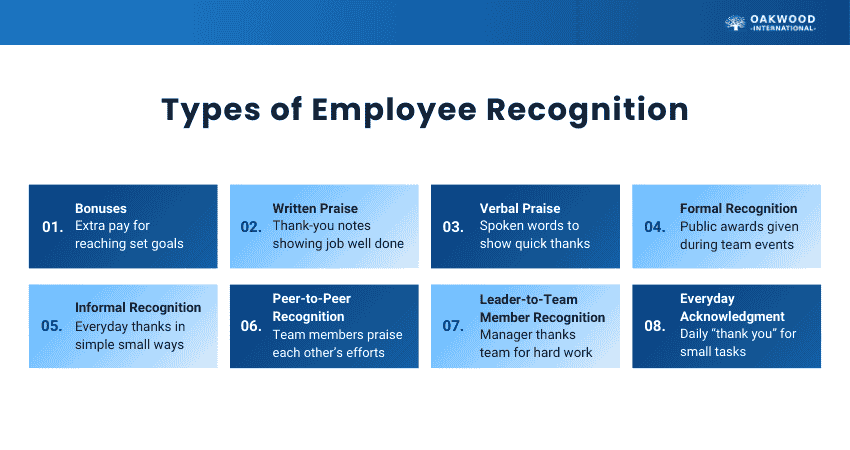
1) Bonuses
Financial rewards highlight the value an organisation places on strong performance. Offering bonuses for achieving goals, exceeding expectations or during key periods reinforces appreciation and encourages continued effort.
2) Written Praise
Personalised emails, notes or letters can provide a lasting form of recognition. Written appreciation reassures employees that their contributions matter and gives them something tangible to reflect on and value.
3) Verbal Praise
Spoken recognition, whether shared privately or in a group setting, shows immediate appreciation. Simple acknowledgements during meetings or after task completion help employees feel seen and valued.
4) Formal Recognition
Structured recognition such as awards, milestones, or anniversaries follows a clear framework. These recognitions create clear goals to work towards and appeal to employees who thrive on achievement and distinction.
5) Informal Recognition
Unplanned gestures of appreciation, such as quick messages or small tokens, reinforce positive behaviour. This ongoing recognition builds a culture where effort and initiative are consistently acknowledged.
6) Peer-to-Peer Recognition
Recognition between colleagues strengthens teamwork and trust. When employees appreciate one another’s efforts, it encourages collaboration and fosters strong working relationships.
7) Leader-to-team Member Recognition
Praise from Managers and leaders carries a strong impact. When leaders acknowledge individual contributions, it boosts confidence and motivation and sets a positive example for the rest of the team.
8) Everyday Acknowledgment
Regular expressions of gratitude, such as thanking team members during meetings or after completing tasks, create a supportive environment. These small, frequent acknowledgements help employees stay engaged and motivated every day.
Lead teams effectively and inspire success. Join the Successful People Management and Team Leadership Course today!
What are the Benefits of Employee Recognition
Building a culture of recognition alongside a thoughtful rewards approach brings visible, meaningful change. Here are some benefits that organisations commonly experience when employees feel genuinely appreciated:
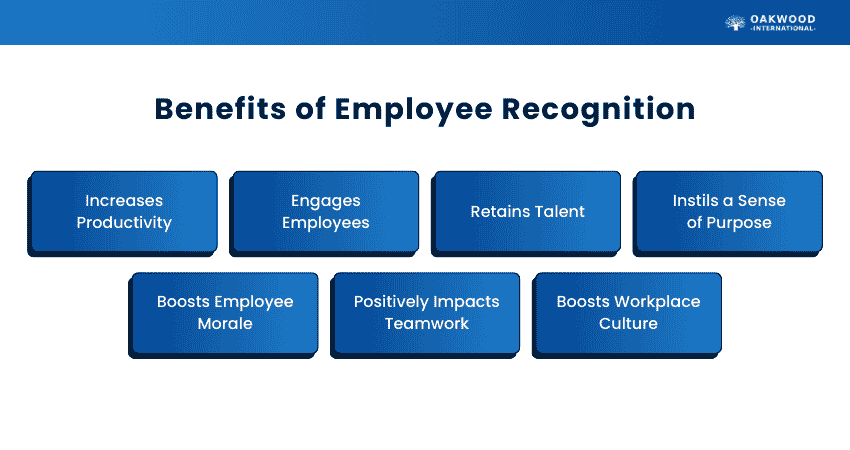
1) Increases Productivity
Clear recognition for meaningful contributions encourages focus and effort. When people know their hard work will be noticed, they are more likely to repeat positive behaviours and align their output with long-term business goals.
2) Engages Employees
Employees are more engaged when they see their work valued. Recognition reinforces purpose, reduces disengagement and encourages people to contribute beyond the bare minimum with energy and pride.
3) Retains Talent
Lack of appreciation is a common reason people leave. Ongoing recognition helps employees feel valued and wanted, making them more likely to stay, grow, and develop their skills within the organisation
4) Instils a Sense of Purpose
When recognition is tied to values and impact, employees better understand how their work contributes to the bigger picture. This clarity gives meaning to daily tasks and motivates people to perform with intention and pride.
5) Boosts Employee Morale
Feeling appreciated prevents employees from feeling overlooked or taken for granted. Recognising effort, commitment, and progress helps maintain enthusiasm and prevents motivation from fading over time.
6) Positively Impacts Teamwork
Recognition strengthens collaboration when it includes teams and peer-to-peer appreciation. Encouraging colleagues to recognise each other builds trust, respect, and a stronger sense of shared success.
7) Boosts Workplace Culture
Recognition lifts morale in a lasting way. When employees feel acknowledged for living company values and treating others well, positivity grows naturally. This healthy culture extends beyond the workplace, improving customer interactions and strengthening relationships.
Build stronger teams with smarter leadership. Learn how in our range of People Management Courses - Sign up now!
How to Build an Employee Recognition Programme?
Employee Recognition can start right away. Having a clear approach helps leaders and managers recognise employees fairly and effectively. If you want recognition to become part of everyday work culture, follow these simple steps:
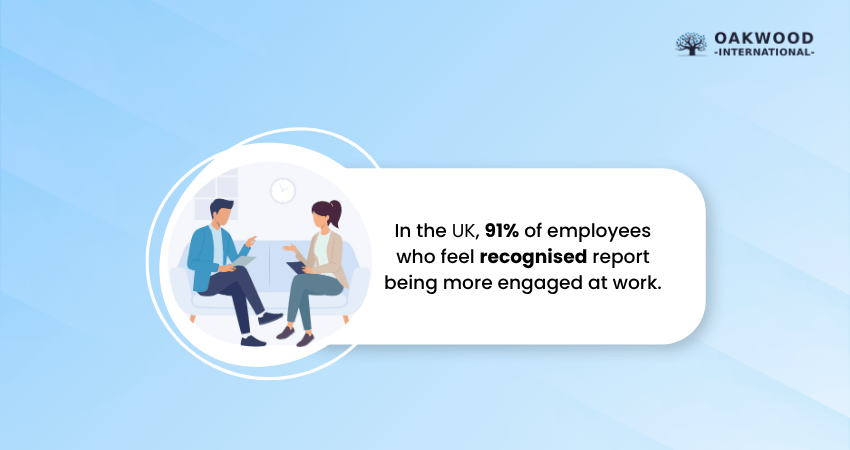
1) Start With a Clear Purpose
Decide what you want recognition to achieve, such as better engagement, stronger morale, or improved retention. A clear goal helps guide the programme. A defined purpose ensures every recognition effort contributes to meaningful, long‑term impact.
2) Involve Your Employees
Ask employees how they like to be recognised. Some prefer public praise, others value private feedback or small rewards. Their input helps shape a programme that feels meaningful. When employees help design the process, they feel more connected and valued from the start.
3) Pick a Manageable System
Decide how recognition will be shared, whether through a platform, meetings or messages. A clear system makes it easier to spot and celebrate good work. A straightforward process encourages consistent participation from everyone.
4) Measure and Iterate
Regularly check what is working and what is not. Use feedback to make small improvements over time. Continuous refinement keeps your recognition programme relevant and effective.
5) Keep It Fun and Varied
Mix up recognition ideas and rewards to keep things interesting. Small creative touches help recognition feel genuine and motivating. Variety ensures the experience stays engaging and doesn’t become routine.
Improve feedback delivery and evaluation skills. Join our Performance Appraisal Training and lead impactful appraisal discussions.
Tips for Making Employees Feel Recognised
Recognition is not a one-size-fits-all approach. To ensure that recognition has the desired impact, consider these tips:
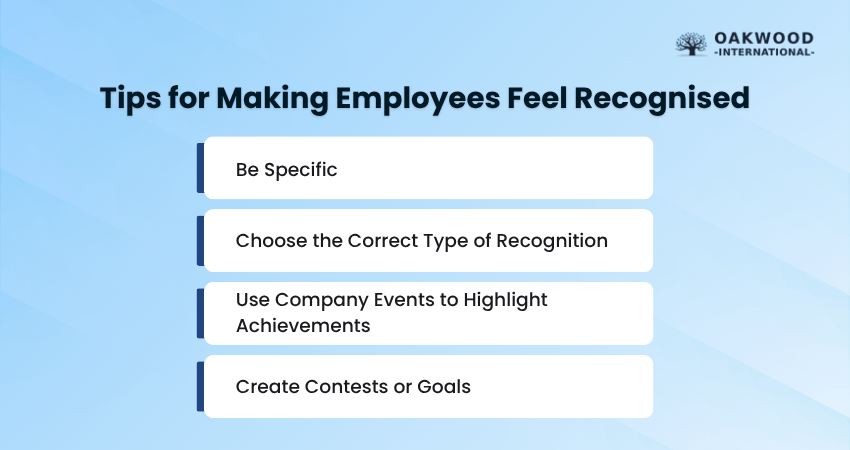
1) Be Specific
When you say, “good job,” also say what the person did well. For example, “You helped the team finish the project on time.” This helps the person feel proud and know what they did right.
2) Choose the Correct Type of Recognition
Some people like to be praised in front of others. Some like it quietly in private. Watch and see what each person likes best. When you praise them the right way, they feel more special.
3) Use Company Events to Highlight Achievements
Company events are a great time to thank workers. Saying “well done” in front of others makes them feel proud. It also makes others want to work harder. This brings the whole team closer.
4) Create Contests or Goals
You can make small games or goals at work. Give prizes to people who do well. This makes work fun and exciting. It also helps people try their best and work together.
Conclusion
Employee Recognition boosts engagement, satisfaction and retention. By acknowledging employee’s efforts through praise or rewards, organisations reinforce positive behaviours and align actions with company values. This helps build a motivated, loyal and productive workplace that drives consistent, meaningful and long-term business success.
Learn how to attract, assess, and hire top talent with our Talent Acquisition Training – Join now!


 Back
Back



 Back to Catagories
Back to Catagories





 + 44 7452 122728
+ 44 7452 122728










